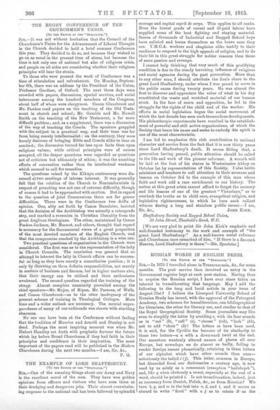THE RUGBY CONFERENCE OF THE CHURCHMEN'S UNION.
[To THE EDITOR OF TIIR SPECTATOR."] SIR,—It was not without hesitation that the Council of the Churchmen's Union for the Advancement of Liberal Thought in the Church decided to hold a brief summer Conference this year. They decided to do so, not because they wished to go on as usual in the present time of stress, but because the time is not only one of national but also of religious crisis, and people on all sides are considering whether their religious principles will bear the strain.
To those who were present the week of Conference was a time of stimulation and refreshment. On Monday, Septem- ber 6th, there was an address by the President of the Union, Professor Gardner, of Oxford. The next three days were crowded with papers, discussions, special services, and social intercourse among the hundred members of the Congress, about half of whom were clergymen. Canon Glazebrook and Mr. Fawkes read papers on the teaching of the Old Testa- ment in church and school ; Mr. Gamble and Mr. Nowell Smith on the teaching of the New Testament, a far more difficult problem; and, as a supplement, there was a discussion of the way of teaching the Creeds. The speakers grappled with the subject in a practical way, and their tone was far from being merely intellectualist ; on the contrary, they were keenly desirous of bringing Bible and Creeds alike to bear on conduct ; the discussion turned far less upon facts than upon religious values; while critical principles were of course accepted, all the deeper questions were regarded as questions not of criticism but ultimately of ethics; it was the numbing effects of convention rather than its intellectual weakness which seemed to call for remedies.
The questions raised by the Kikuyu controversy were dis- cussed at twe meetings of intense interest. It was generally felt that the relation of the Church to Nonconformists in respect of preaching was not one of extreme difficulty, though of course it had to be approached with caution. But in regard to the question of joint Communions there are far graver difficulties. There were in the Conference two drifts of opinion. One, ably set forth by Canon Bannister, insisted that the decision of the Archbishop was actually a retrograde step, and marked a recession in Christian liberality from the great Anglican theologians. The other, maintained by Canon Foakes-Jackson, Mr. Emmet, and others, thought that regard is necessary for the Sacramental views of a great proportion of the most devoted members of the English Church, and that the compromise reached by the Archbishop is a wise one.
Two practical questions of organization in the Church were considered. The first was as to the representation of the laity in Church Councils. The convictible was general that no attempt to interest the laity in Church affairs can be success- ful so long as they have merely a consultative position ; it is only by throwing on them definite responsibilities, not merely in matters of business and finance, but in higher matters also, that their energy can be utilized and their enthusiasm awakened. The second question regarded the training of the clergy. Almost complete unanimity prevailed among the chief speakers—Mr. Major, of Ripon, Mr. Parsons, of Wells, and Canon Glazebrook—as to the utter inadequacy of the present scheme of training in Theological Colleges. More time and a wider outlook are necessary. The mental unpre- paredness of many of our ordinands was shown with startling clearness.
No one can have been at the Conference without feeling that the tradition of Maurice and Arnold and Stanley is not dead. Perhaps the most inspiring moment was when Mr. Hubert Handley set forth with prophetic fervour the future which lay before Broad Churchmen if they had faith in their principles and confidence in their inspiration. The most important of the papers read will be published in the Modern Churchman during the next two months.—I am, Sir, &c., P.O.


































 Previous page
Previous page